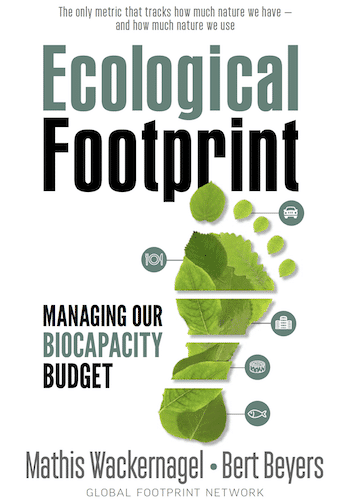
In this book, Mathis Wackernagel and Bert Beyers introduce the basic concepts, from Footprint to biocapacity and overshoot. They explain applications of this accounting tool as well as the implications of overshoot. This book is an ideal introduction to the topic.
OVERVIEW
The only metric that tracks how much nature we have – and how much nature we use
Ecological Footprint accounting, first introduced in the 1990s and continuously developed, continues to be the only metric that compares overall human demand on nature with what our planet can renew ― its biocapacity ― and distils this into one number: how many Earths we use.
Our economy is running a Bernie Madoff-style Ponzi scheme with the planet. We use future resources to run the present, using more than Earth can replenish. Like any such scheme, this works for a limited time, followed by a crash.
Avoiding ecological bankruptcy requires rigorous resource accounting ― a challenging task, but doable with the right tools.
Ecological Footprint provides a complete introduction, covering:
* Footprint and biocapacity accounting
* Data and key findings for nations
* Worldwide examples including businesses, cities, and countries
* Strategies for creating regenerative economies
Whether you’re a student, business leader, future-oriented city planner, economist, or have an abiding interest in humanity’s future, Footprint and biocapacity are key parameters to be reckoned with and Ecological Footprint is your essential guide.
AWARDS
- FINALIST | 2020 Eric Zencey Prize
- SILVER | 2019 Nautilus Book Awards: Ecology & Environment
- FINALIST | 2019 Foreword INDIES: Ecology & Environment
PRAISE
If we did to our bank account what we have been doing to the Earth’s natural capital we would have been bankrupt long ago. The planet has been extremely lenient with us but that resilience is about to give way to a natural and human crisis. This book is a loud wake up call to everyone.
— Christiana Figueres, former Executive Secretary, UNFCCC
In the nick of time, as humanity crashes up against the resource limitations of our collective twenty first century lifestyles, Ecological Footprint provides a clear eyed and accessible analysis of the challenge. With clarity and compassion, Ecological Footprint reveals both our alarming self-inflicted situation and the way forward. Wackernagel and Beyers’ well written book has the power to turn the tide.
— late Thomas E. Lovejoy, Professor of Environmental Science and Policy, Institute for a Sustainable Earth George Mason University
A superb treatment of Ecological Footprint accounting as a part of our global balance sheet. Regardless of whether you are a student, a teacher, or an economist, you will find much of substantial importance in this book.
— Peter H. Raven, President Emeritus, Missouri Botanical Garden, St. Louis
Looking for a science based practical tool to navigate your future on Earth? Here it is. Ecological Footprint provides an integrated and concrete measure of our human pressure on the Planet. We all urgently need to reconnect our lives to planet Earth and adopt a biocapacity approach to modern life, translating it into concrete steps of how each and every one of us can contribute to building resilient and sustainable societies.
— Prof. Johan Rockström, Director of the Potsdam Institute for Climate Impact Research
This excellent book helps us understand and truly appreciate Nature’s capacity to continue to provide life support for our planet and for all of its inhabitants.
— Julia Marton-Lefèvre, Former Director General, International Union of Conservation of Nature


